 Straight after Tim died, my head was full of fog. I felt disconnected from the world. And I think this was my brain protecting me from the awfulness of what had just happened. While the disconnection went away, the brain fog – known as widow brain or grief brain – stayed. It's a feeling that you can't think straight, and with it comes short term memory loss, numbness, lack of ability to process information or instructions, tiredness and lack of focus. It can also leave your temper out of kilter - I snapped at people and got very angry at myslef. But be reassured – it's normal. Our brains are acting to protect us from the trauma. Widow brain, for many people, lifts in the first year to 18 months, but it lasts for different lengths of time for different people, and stress or milestones can make it worse. For people who have been caring for someone for a long time, part of widow brain may be a loss of purpose. Grief can also mean not eating properly, not exercising, or not sleeping well, and this all feeds into widow brain. The science bit Emotional traumas affect how our brains work. Imaging the brain shows that mental and physical pain trigger the same areas of the brain. While it's nothing like the same level of trauma, a brain imaging study in people who have recently split up with their partners shows that it affects their executive function, the system in the brain that sits in the prefrontal cortex and supports your ability to understand, decide, recall, memorise and have self-control. Your prefrontal cortex gets overloaded by grief and makes it harder to function well. The practical bit Rest Grief has made me the most tired I have ever been. So tired my bones hurt. Rest your mind and your body when you can. Tell people Explain to people what's going on in your head, and send them this blog post if they don't get it. Decisions A really useful piece of advice for me was not to make any major decisions for the first year. To do lists and notes Write things down. To do lists are useful, and have stopped me forgetting to do many, many things (the combination of widow brain and ADHD really doesn't help my memory!) Break tasks down into the smallest bits possible – rather than having a to do for 'put everything into my name', break it into house insurance, deeds, rent' etc. That way tasks are less daunting, and crossing off each small thing make it feel like an achievement.
Reminders Digital reminders rule my life. I use smartphone alarms to remind me to do things that are daily or weekly. I put appointments with reminders on my digital calendar for everything from whether it's bin day or recycling day, through birthdays, to work deadlines and days out, and I can access this on both my phone and my computer. Physical reminders can also be helpful. If you need to remember to take something with you when you go out, put it on the doormat, or leave a sticky note on the front door (I get through a lot of sticky notes). Out-sourcing Have a pad of sticky notes and a pen somewhere convenient. When you think of something that needs doing, write it on the sticky note and put it on the wall. When someone says 'what can I do', give them a sticky note. Stilling the whirling thoughts Grounding can help to still your brain when everything is churning around and destroying your ability to focus. Self-care Be kind to yourself and forgive yourself. Remember – you are only human. You've been through a lot. And you are grieving. It's not your fault your head is like this. In the end, things getting missed or forgotten are very rarely the end of the world.
13 Comments
You walk out of the house/hospice/hospital, and close the door behind you. You know that your life is never going to be the same again. Your brain is full and spinning. Part of you doesn't believe that it's real, and part knows that you will carry this loss for ever. People are around you loving you, caring for you, but you feel numb, distant, separate. You want to be alone with your thoughts but you need to be surrounded by people. The world carries on as if nothing has happened but for you it has stopped.
Tim Dudley 1 December 1967 to 24 February 2018 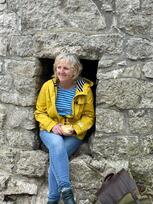 As I said in an earlier post, once we have lost someone close, subsequent losses can bring things back up to the surface. This week I lost a friend, the wonderful Claire McKenzie, and her husband John has joined the club that none of us want to be in. Claire was an amazing support to me after Tim died. I and a group of friends will be raising money for Ashgate Hospice, her home for the last week of her life. I'm going to (virtually) row the channel and back. Carrie, who set up the fundraiser, is walking 150 miles in 28 days, the equivalent distance from Tideswell to her old workplace in Soho. That's an average of just over five miles a day - come rain, hail or snow. Fi, Alice, Ged, Peter and Beth will all be taking part in Ashgate's High Peak Trail walk. There will be more challenges through the year. If reading The Widow's Handbook has struck a chord with you, and if you can, please consider donating to Team Tidza 2022: Celebrating our friend Claire McKenzie. 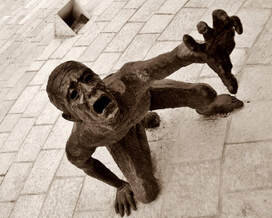 Tim died suddenly in the early hours of the morning. His heart just stopped. He had type 2 diabetes that he perhaps didn't manage as well as he should, and he had been feeling tired. But he was a bookseller, and we were in the process of moving his enormous stock of books from one storage unit to another. I asked him if he was having chest pain, and he said no. So, I brushed it off as simple weariness. A banana box of books weighs a lot, after all. After he died, and the post-mortem revealed heart failure related to type 2 diabetes, I was wracked with guilt. What could I have done? Monitored his diet more closely? Watched him take his tablets three times a day? Insisted he went onto insulin? Got the truth out of him about how he was actually feeling? If he'd died in an accident, I suspect I would have felt guilty for not giving him a lift that day, or persuading him to get the bus, or agreeing that he should cycle. That's one kind of guilt after someone dies. There's also the guilt of feeling that you didn't say what you should have, or said what you shouldn't have. Did I tell him I loved him the night before? Did we work too much and not spend enough time together? What if our last night out had been a terrible one (rather than the wonderful evening it was), or if I'd persuaded him that we shouldn't go? How would I feel if we'd had an argument? This kind of guilt may become more complicated if you had a difficult relationship with the person who died. As survivors, we can often feel guilty that we are alive, and our partner is dead. This is particularly intense for people surviving an incident where their partner died. Survivor guilt can also be a symptom of post-traumatic stress disorder (PTSD) – talk to your doctor or a psychotherapist if you think you might have PTSD. In grief, I became full of 'I should have…' 'I could have…' 'I would have…' But feeling guilty doesn't mean that we are guilty – it's us trying to put order into the chaos that grief is. If we can blame someone, especially ourselves, we can think we get back control. What can we do?
I'm not sure about my thoughts on an afterlife, but a few days ago I saw a post about Storm Dudley. Buxton Weather Watch @buxtonweatherw Hi all. A very active few days of weather ahead with both storm Dudley and storm Eunice producing disruptive winds. Storm Dudley arrives today with winds strengthening to 50mph during the afternoon, to around 60mph by 6pm, this lasting through much of tonight and into Thursday. Showers at times during this period however no disruptive rain. Additional care needed if travel over higher routes is planned. However, not expecting storm Dudley itself to produce any major disruption  Just after Tim (Dudley) died, the Beast from the East hit. Tim loved snow, and would call me from downstairs in the shop to say "Snowing!" whenever a few flakes started. I left my village to head south before the roads closed, and just managed to get back a few days later, after being pampered and cosseted by my sister. I remember vividly standing in snowdrifts and looking up at the sky, saying, "Darling, I know God has put you in charge of the weather, and you're having fun, but that's enough." The snow even delayed his post-mortem. The post from Buxton Weather Watch reminded me about this, and I messaged to some friends: "Tim is making himself known around his anniversary. I told God he shouldn't have put him in charge of the weather." These are my continuing bonds with Tim. The continuing bonds model Many models of grief are linear, and go through a range of steps, ending up with acceptance and a new life. While models like the pinball machine and growing around grief do accept that it's more complicated than that, the idea of continuing bonds reflects that we don't just take our grief with us, we take the people that we have lost with us too. It accepts that staying connected with the people we love is normal. The idea of continuing bonds comes from the book 'Continuing Bonds: New Understandings of Grief', edited by Dennis Klass, Phyllis Silverman and Steven Nickman, all experts in grief. Instead of focusing on letting go, continuing bonds talks about building a new relationship with the people that we have lost. This relationship we will take with us for always.
Continuing bonds with our late partners include:
Continuing bonds is a normal part of grief. However, if you feel stuck in grief, or trapped in the connections you have with your loved one, you may have developed what's called complicated grief disorder. This includes exaggerated grief symptoms over a long period, sometimes years or decades. If you feel you have this, it's worth talking to your GP, a counsellor, or a psychotherapist. 'Grief is a chasm' image shared with permission from Nansy Ferrett-Paine of Monster-Nip Art 'Grief is a chasm' image shared with permission from Nansy Ferrett-Paine of Monster-Nip Art
The death of a spouse or partner is different than other losses, in the sense that it literally changes every single thing in your world going forward. When your spouse dies, the way you eat changes. The way you watch TV changes. Your friend circle changes or disappears entirely. Your family dynamic/life changes or disappears entirely. Your financial status changes. Your job situation changes. It effects your self-worth. Your self-esteem. Your confidence. Your rhythms. The way you breathe. Your mentality. Your brain function. (Ever heard the term 'widow brain'? If you don't know what that is, count yourself as very lucky.) Your physical body. Your hobbies and interests. Your sense of security. Your sense of humor. Your sense of womanhood or manhood. EVERY. SINGLE. THING. CHANGES. You are handed a new life that you never asked for and that you don't particularly want. It is the hardest, most gut-wrenching, horrific, life-altering of things to live with. Kelley Lynn Losing our partner is one of the most shattering losses we can go through. But alongside that are all the secondary losses, many of which are unexpected One of the first things I was told about being widowed is that we lose our past, our present and our future. That hadn't even occurred to me. I just thought of what I had lost in the 'now', and the grief and pain that was overwhelming. I then started to find out about the extra losses. I was fortunate in that I had the house, that I could manage on my salary, and that my business was mine, not ours. But some people have to leave the house they shared because they can't afford the rent or mortgage alone, or because they weren't married and it goes to their partner's family.
Some widows lose their jobs because they are not able to return to work through grief, or they worked in their partner's business and are unable to run it alone. These issues may also mean that they have to move away from the area, losing their network of friends and/or family, and their feeling of being part of a community. Bereavement can lead to a loss of faith or belief, and this in turn leads to a loss of a community. Some people lose family, and friends too, because they can't cope with grief, or because of rifts over the cause of death or over money. Losing the role of caregiver can lead to a loss of purpose and feeling that a role is gone. On the flip side, the lost partner may have been the caregiver, leaving the widow both alone and without practical or emotional support. Tim had a phenomenal memory, and though we were only together around a decade, we had known each other since our early twenties. So I have lost so many memories, so much shared language and all our shared stories. I also lost our shared future. All those things we planned to do together. I chose not to have children. But for many widows, losing a partner loses the cherished dream of children together. We lose our emotional supporter, our biggest cheerleader when we lose a partner. But for some widows this is made harder by discovering difficult things after their death, which will be forever unresolved. Dealing with secondary loss is hard, as they often emerge just as we are starting to come to terms with our initial loss and regain our routines. For me, it was a case of going back to my early coping strategies of one breath, one step and one moment at a time, and accepting that I was forever changed by my loss. I also had to understand that these secondary losses were real – just as real as the primary loss. Secondary losses still appear, even four years on. And I catch my breath, and grieve again.  The cost of living is climbing, and that puts a squeeze on all of us. Here are some hints and tips that might help a little, and some of them will help the planet too. People who are widowed don't just lose their partner – they lose their partner's income, and may lose access to their partner's pension and their home. These are part of the secondary losses. Money is the last thing we want to have to worry about while we are grieving. Benefits and grants Make sure that you are claiming all the benefits that you are due. The Citizens Advice Bureau can help. For new widows, there are some specific benefits, including the funeral expenses payment and the bereavement support payment. The support payment is currently only due to husbands, wives and civil partners, but this is set to change in 2022.
Heating, lighting and hot water
Broadband, phone and TV
Food shopping
Cooking
Transport
Shopping
Keeping fit
Budgeting, saving and borrowing
Other
Other resources Citizens Advice: If you are struggling with living costs Martin Lewis' MoneySavingExpert website, including Tips, Tricks and Treats StepChange, a debt charity Money Advice Trust 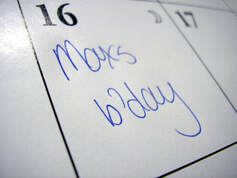 "The pain of grief never really goes away. You just learn to wear it. But it's so raw for so long. And the awful year of firsts. And not being able to move things because they were the last person to touch it. And the more things that you move, the fewer things you have that they've touched last, and you feel like you're inadvertently erasing them. Hoping their clothes will retain their smell but they don't. Grief is so so complicated." The time after they die is so full of firsts. That first time you go to bed and there's an empty space next to you. The first time you wake up in a world where they are no longer. The first time you do a load of washing that only contains your own clothes. The first meal for one. The first time that you change the bedding, and the bed no longer smells of them. The first shop that doesn't contain that little extra something that you always picked up. Moving past the milestones The milestone dates – your birthday, their birthday, Christmas – are tough. These are things that should be full of joy, but instead they trigger memories of what we have lost, and they remind us that our people aren't here. There are also the anniversaries of their diagnosis, admission to hospital and death. When I came up to the day before the first anniversary of his death, I honestly didn't know how I was going to get through the next 24 hours. A friend from Widowed and Young told me that I had survived the day of his death, and that no anniversary could ever be worse than that. That helped me a lot. For me, the first New Year was tough. This was partly because we had been going to the same New Year's Eve party, dating back to years before we were married. But most of all, it was because it heralded a year that Tim would never see. The firsts don't necessarily end after a year. There will be others – the first wedding, the first time a friend or relative has a baby, the first death of someone close. In my experience, the run up to the milestones are worse than the days themselves. For me, the length of day, the temperature, the weather, the emerging of the snowdrops, all remind me of the time of year and the anniversary of his death. People reminisce about the Beast from the East, and that was around the time he died. The milestone day dawns with a small sense of relief. Coping with the firsts
 When we are first bereaved, it can feel like a set of old-fashioned scales with all the weight down on one side.  As time goes by, we add things to the other side. The weight of our grief doesn't get any less, but we get a new balance as our life gets bigger (see also Growing around grief). |
AuthorI was widowed at 50 when Tim, who I expected would be my happy-ever-after following a marriage break-up, died suddenly from heart failure linked to his type 2 diabetes. Though we'd known each other since our early 20s, we'd been married less than ten years. Archives
July 2024
Categories
All
|

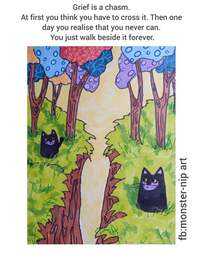
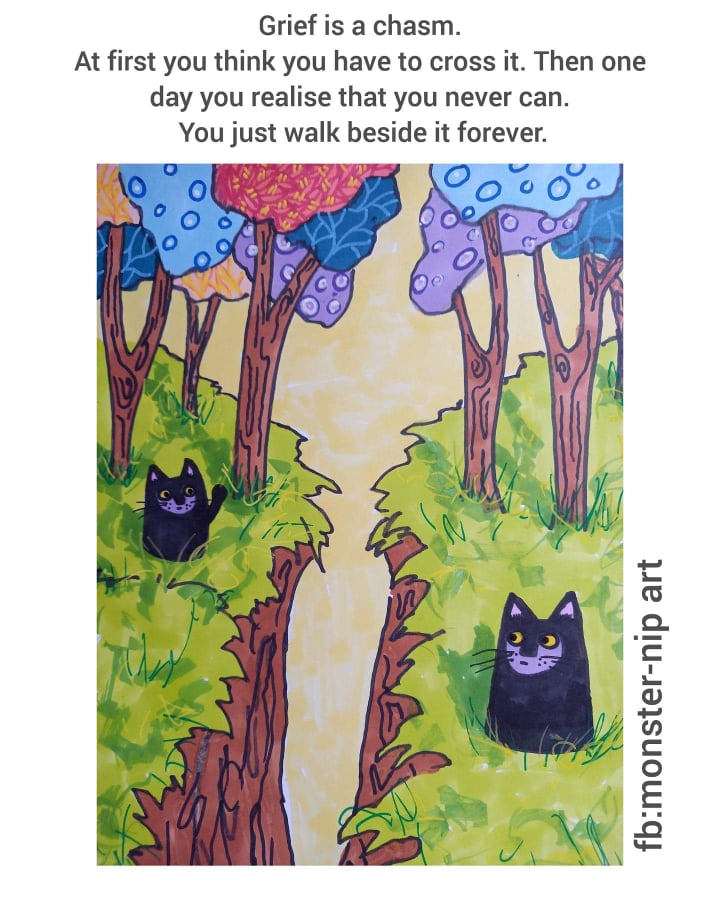
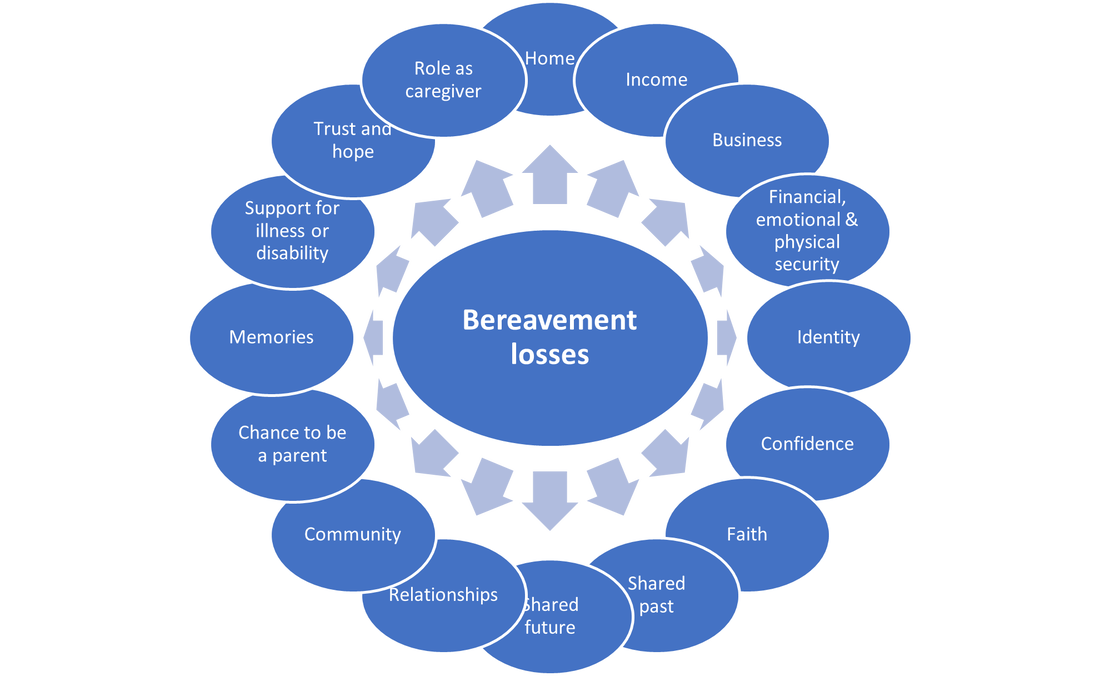

 RSS Feed
RSS Feed